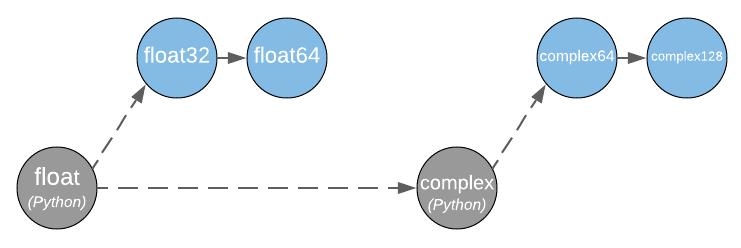Data Types¶
Array API specification for supported data types.
A conforming implementation of the array API standard must provide and support the following data types.
bool¶
Boolean (True or False).
int8¶
An 8-bit signed integer whose values exist on the interval [-128, +127].
int16¶
A 16-bit signed integer whose values exist on the interval [−32,767, +32,767].
int32¶
A 32-bit signed integer whose values exist on the interval [−2,147,483,647, +2,147,483,647].
int64¶
A 64-bit signed integer whose values exist on the interval [−9,223,372,036,854,775,807, +9,223,372,036,854,775,807].
uint8¶
An 8-bit unsigned integer whose values exist on the interval [0, +255].
uint16¶
A 16-bit unsigned integer whose values exist on the interval [0, +65,535].
uint32¶
A 32-bit unsigned integer whose values exist on the interval [0, +4,294,967,295].
uint64¶
A 64-bit unsigned integer whose values exist on the interval [0, +18,446,744,073,709,551,615].
float32¶
IEEE 754 single-precision (32-bit) binary floating-point number (see IEEE 754-2019).
float64¶
IEEE 754 double-precision (64-bit) binary floating-point number (see IEEE 754-2019).
Note
IEEE 754-2019 requires support for subnormal (a.k.a., denormal) numbers, which are useful for supporting gradual underflow. However, hardware support for subnormal numbers is not universal, and many platforms (e.g., accelerators) and compilers support toggling denormals-are-zero (DAZ) and/or flush-to-zero (FTZ) behavior to increase performance and to guard against timing attacks.
Accordingly, subnormal behavior is left unspecified and, thus, implementation-defined. Conforming implementations may vary in their support for subnormal numbers.
Future extension
complex64 and complex128 data types are expected to be included in the next version of this standard and to have the following casting rules (will be added to Type Promotion Rules):

See array-api/issues/102 for more details
Note
A conforming implementation of the array API standard may provide and support additional data types beyond those described in this specification.
Data Type Objects¶
Data types (“dtypes”) are objects which are used as dtype specifiers in functions and methods (e.g., zeros((2, 3), dtype=float32)).
Note
A conforming implementation may add additional methods or attributes to data type objects beyond those described in this specification.
Note
Implementations may provide other ways to specify data types (e.g., zeros((2, 3), dtype='f4')) which are not described in this specification; however, in order to ensure portability, array library consumers are recommended to use data type objects as provided by specification conforming array libraries.
A conforming implementation of the array API standard must provide and support data type objects having the following attributes and methods.
Methods¶
|
Computes the truth value of |
Default Data Types¶
A conforming implementation of the array API standard must define the following default data types.
a default floating-point data type (either
float32orfloat64).a default integer data type (either
int32orint64).a default array index data type (either
int32orint64).
The default floating-point data type must be the same across platforms.
The default integer data type should be the same across platforms, but the default may vary depending on whether Python is 32-bit or 64-bit.
The default array index data type may be int32 on 32-bit platforms, but the default should be int64 otherwise.
Note
The default data types should be clearly defined in a conforming library’s documentation.
Data Type Categories¶
For the purpose of organizing functions within this specification, the following data type categories are defined.
Note
Conforming libraries are not required to organize data types according to these categories. These categories are only intended for use within this specification.
Note
Future versions of the specification will include additional categories for complex data types.
Numeric Data Types¶
int8, int16, int32, int64, uint8, uint16, uint32, uint64, float32, and float64 (i.e., all data types except for bool).
Integer Data Types¶
int8, int16, int32, int64, uint8, uint16, uint32, and uint64.
Floating-point Data Types¶
float32 and float64.
Boolean Data Types¶
bool.